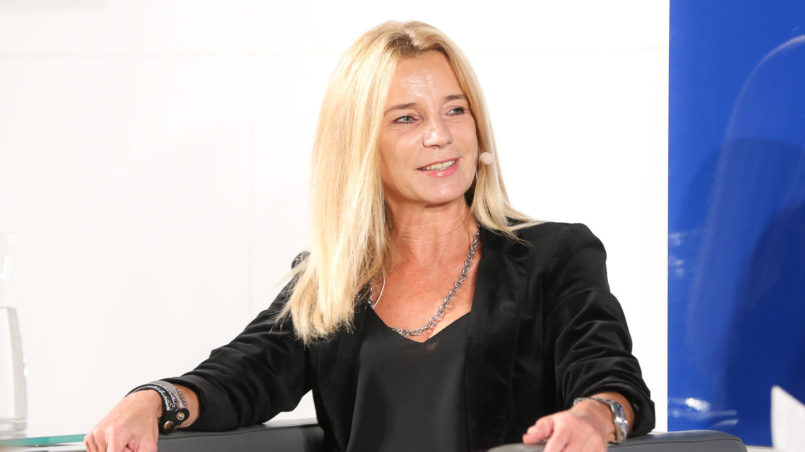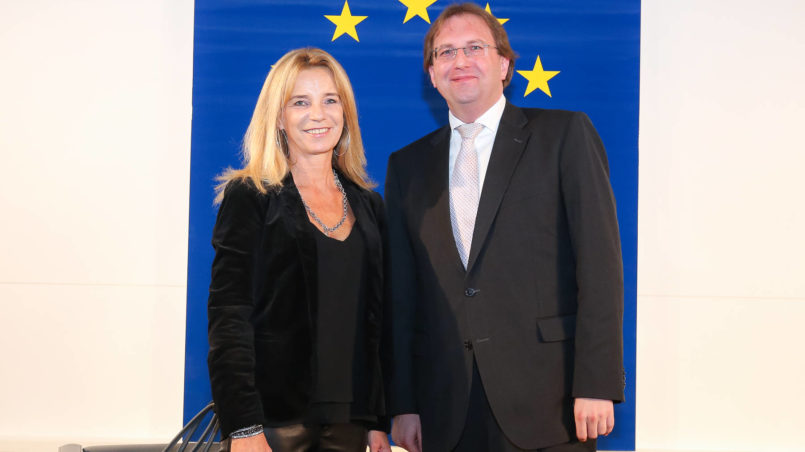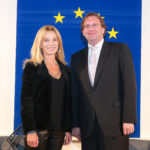Europa DIALOG with ORF France correspondent, Eva Twaroch

Event data
- Datum
- 25. 10. 2016
- Host
- Europa:DIALOG
- Location
- Haus der Europäischen Union, Wipplingerstraße 35, 1010 Wien
- Event-type
- Dialog
- Participants
- Eva Twaroch, ORF-Korrespondentin in Paris
- Benedikt Weingartner, Moderator
On 25th October 2016, within the framework of the Europa DIALOG series, the ORF correspondent in Paris, Eva Twaroch, spoke on the topic of France, with a focus on “terror attacks”.
Moderator: Benedikt Weingartner
Summarised, Eva Twaroch described Europe as follows:
For me Europe is the only way to master the challenges and problems of the 21st century. The central principle that politicians of all persuasions and EU states have to finally learn is: WE are Europe and not the others.
DIALOGUE
What is your personal attitude to Europe and the European Union?
For Twaroch the references are diverse, the most important is having two daughters who were born in France, who are growing up there as “true Europeans” and who show her every day what Europe is. Her daughters feel just as home there as here.
If you live in France, Europe is always an issue. However, in the last few decades, Europe has not openly committed itself. She would wish to see politicians in France, in Austria and in the other European states consider Europe less as “the others” and rather arrive at the conviction that: “We are Europe”. Twaroch is convinced that “we need more Europe and not less”.
We still have vivid memories of the terror attacks – Charlie Hebdo, Nizza. What has changed in France since then?
France has changed – in particular the lightness as regards mood and the attitude towards life has got lost to a certain extent in the last 18 months. The fear of terror is constantly present. After 13th November, we know that “it could have happened to all of us” – anytime and everywhere, regardless of your race or religion. In Paris almost everyone knows someone who has been affected in some way.
These events have left tangible traces.
Has much changed since the presence of the military police? Are there more stringent controls or stricter restrictions?
When the state of emergency was introduced, Twaroch considered it astonishing and unexpected – after all, “freedom” is in the Constitution and the introduction of the state of emergency presents a restriction of basic freedom, which was not greatly discussed, neither by the media nor the population.
I read in an article about the plan to train state officials to recognise potential assassins or terrorists. The psychologist said in an interview that she is very afraid and that she works with many who are suspected of being terrorists. She predicts that much more will happen and wishes for more control. Do you believe in these horror scenarios?
France has become much more careful as regards communication on everything that has been discovered in the last few months about sleeper cells and foiled attacks. Such things are only seldom made public.
The situation in Germany is different: the Ministry of the Interior immediately went public because an attack had been thwarted or because someone who was possibly planning an attack was arrested. In France there are actually many more concrete plans which have been foiled but this is not communicated so frequently.
On the tighter controls: in large supermarkets there are already bag controls but everyone is aware that, that which, above all, specialists fear cannot really be prevented, namely that individual terrorists take action.
The Metro stations or gatherings of people, for example, cannot be made truly secure.
We saw at the football EM that there were major security measures in place around the stadium and fan zones but at the same time it was possible to travel right to the stadium with the train RER without being controlled even once. There, the focus was much more on visible measures for deterrence purposes but also on giving the population a feeling of safety again.
If we examine and question this closely, one knows, however, that nothing will be achieved with these measures.
There was much criticism regarding Nice: it was the national holiday and, despite all the vigilance concerning terror, it was possible for the perpetrator to drive his truck into the mass of people. What did this trigger?
The criticism is justified. In the case of the attacks in Paris, the accusation that the secret services had failed was justified because some of the perpetrators were already known.
On the contrary, Nice was completely different: the attacker had not been on the radar and the question simply centred on the security issue.
On the one hand, Nice has been known as the safest city in France for seven or eight years. There are the largest number of surveillance cameras, there are very many city policemen/policewomen – this was always the city’s “trademark”. How could it happen that, despite the prohibition of lorries on the Promenade des Anglais, that someone was able to drive up and down the road on eleven occasions over a period of three days and inspect everything closely without the police being sent to investigate who this was?
On the other hand, the football EM was just coming to a close and for months Nice had been applying to be proclaimed the safest city in France. But when an event brought 30,000 people together, there was practically no security.
Are the French people actually aware that France, together with Germany, conducts the EU in a quasi “binary star”?
The interest in France on Europe as an authority is very low:
If you recall: due to its non-adherence of criteria at that time, France received a warning. This was given significant coverage in the ZIB (Austrian news) at the time but France only gave this fourteenth place i.e. it was only covered in a small report with one reporter who only uttered three sentences on the subject.
Europe only ever becomes an issue for France when the discussion revolves around the role it could play within the EU. Only the last two presidential periods showed that France no longer plays this great role.
Hollande and Merkel are an unequal pair in a kind of “marriage of convenience”. In France it is said that Hollande needs Merkel as he has to show in some way or another that France has “something to say”. And Merkel Leeds Hollande because she cannot stand alone in Europe. Thus, she needs his support and he needs her in order to show that he is not so unimportant.
Can France become even more social?
The question is only whether that makes sense and can be justified from an ecomomic perspective. France already has a hardened social system which is difficult to reform and the social standards are already very high …
Since 2004 Marine le Pen has a seat in the European Parliament and is heavily involved in French national politics. How would you describe this woman?
She is currently the head of a party with the greatest number of votes in France and the only female candidate for the presidential election who has a “fixed ticket for the run-off election” in her pocket. All polls would confirm this. As such she really has achieved much in political terms.
Marine le Pen is often described as a sheep in wolf’s clothing. Her policies are much “rounder” than those of her father i.e. she has fewer rough edges than him. She has also expelled her father the political party and attempts to be different. Ultimately, however, the programmes and contents are very very similar to those of her father but the tone is different and as such she has become more acceptable.
However, it has to be said that the Front National is clearly characterised as “extreme right” throughout France and not only in the left and left-left media. That is the “extrême droite” for which there is no alternative term. And despite this, Marine le Pen managed, for example in Fréjus, to drum up a “competely different audience” and to become electable. Suddenly you become an uncomplicated Front National supporter. They currently dominate in the election campaign and specify the topics.
In spite of this, nobody believes that they could win in the second round but in five years they could possibly achieve this.
Marine le Pen quite provacatively said: France is like a raped woman and has to liberate herself”… What does this woman do that she appears so dedemonising?
Election campaigns are always partially held further right and this of course helps her credibility.
Marine Le Pen’s ideas have become acceptable to the general public by stepping into this right terrain. (…) In this election she is regarded as a friend of Russia and would like to see a completely different French foreign policy there. (…) If she came to power, this would be a shift in paradigm which has not been witnessed for decades. Suddenly the orientation is towards Russia and no longer the USA.
With Le Pen, France would not only be “more nationalistic” but also this would be a real change in the direction and course for France and Europe.
This increasing right populism in Europe is also, among others, the work with certain means: with scaremongering. How does this appear in France?
Now everyone is saying: one more attack and Marine le Pen will win the second round. Of course there is this connection. Of course there is fear that these events play into the hands of the right populists.
Some would want to create deradicalisation measures while others would say that all those who have a so-called “security file” i.e. those who act suspiciously without however becoming criminals, should be observed.
The further right a politician currently is, the wilder are his demands such as, people with a security file should be locked up immediately, ideally they should have to wear an electronic foot tag, immediate arrest, reception camps and immediate deportation of foreigners – and all this in violation of all legal standards and principles of our constitutional states.
The refugee situation: immigration and migration belong to French history. How does France handle the wave of refugees?
Immigration has a long tradition in France. France, however, was largely untouched by the refugee waves of the last two years. And in the meantime the process has continued gradually and no measures have been taken. As a result, relatively many “wild” refugee camps have emerged, above all in Paris, and that is shocking to observe.
I myself was in one of these refugee camps a few weeks ago: one is in the 18th district in the north of Paris and hundreds of people are lying around in an improvised refugee camp. (…) What was coming was simply underestimated.
Only when terror came into the country was the “German welcome culture” considered mainly responsible for this. But France has been for the most part untouched by the refugee wave.
Fewer refugees from Syria came to France, rather African migrants; one was hardly prepared for this. And now it is very difficult to deal with the situation.
What is the role of France as leading NATO member and key player in the flashpoints? Is France in a position to become the “security police” number one in Europe?
France does indeed go it alone; one hoped to see Hollande in the most diverse of ares but not as a warlord. But this was what he did at first: Mali, Central Africa, Syria, Iraq – France goes there at times alone and conveys the impression that it is making these decisions alone.
They want to take on the leading role in matters of security but at the same time they knew that this would not be possible in the long term.
CETA and TTIP: Is this a significant subject in France?
For a long time, CETA was not a topic in public. No notice at all was taken of it and the media only began to deal with it at an extremely late point in time.
The election campaign is currently underway on topics such as unemployment, security and immigration and the European component largely remains on the sidelines.
How do the French perceive the Austrians?
When the media report on Austria, then it is primarily about the country’s past. Only seldom is there a positive image of Austria in the media coverage, there is not enough differentiation.
Regarding the school system, in France foreign languages are extremely neglected – the French, like before, can hardly speak English.
Why do you love France?
She stresses that she has been living in France as a correspondent for 25 years and still feels as if she has not yet discovered everything. One could hardly say anything better about one’s own profession…
What particular wishes do you have Europe – for the people and for you personally?
I want more Europe but I do not define this in terms of more regulation or more agreements on detailed issues but rather I would much rather have a Europe that goes towards a community of values.



